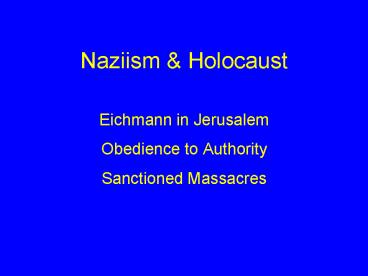Naziism - PowerPoint PPT Presentation
Title:
Naziism
Description:
Naziism & Holocaust Eichmann in Jerusalem Obedience to Authority Sanctioned Massacres Psychology s Response to Fascism Obedience -- Milgram & others ... – PowerPoint PPT presentation
Number of Views:93
Avg rating:3.0/5.0
Title: Naziism
1
Naziism Holocaust
- Eichmann in Jerusalem
- Obedience to Authority
- Sanctioned Massacres
2
Psychologys Response to Fascism
- Obedience -- Milgram others
- Authoritarianism -- Adorno et al
- others
3
Anti-Semitism
- Christian Jews as killers of God
- agents of Satan / killers of babies
- money-lenders
- Nazi communist conspiracy
- conspiracy of financiers
- biological race theory parasites
- bacteria
- vermin
4
Eichmann in JerusalemHannah Arendt
- From minor bureaucrat to organizer of holocaust
- Not anti-Semitic
- Authority, loyalty bureaucracy put conscience
out of commission - frighteningly normal
5
Milgram Obedience Experiment
- Subject plays teacher role
- Confederate plays learner role
- Confederate plays experimenter role
6
Milgram Obedience Experiment
- Series of experiments
- Indep. variables proximity of authority
- salience of victim
- group admin of shock
- Dep. Variable shock level
7
Results from main variations
8
Results from main variations
9
Factors increasing obedience
- Authority of experimenter
- Proximity of experimenter
- Distance form victim
- Absence of dissenters
- Presence of other compliers
- Reduced role in giving shock
- Authority of institution
10
Milgrams Theory
- Force fields
- Subject switches state
- autonomous ? agentic
- conscience inhibited in agentic state
11
Zimbardo Prison Experiment
- Abu Ghraib?
12
(No Transcript)
13
(No Transcript)
14
15
Zimbardo Prison Experiment
- Random assignment of prisoners guards
- 5 released extreme emotional depression,
crying, rage and acute anxiety - Ended after 6 days
16
Zimbardo Prison Experiment
- Guards found sense of power was exhilarating
- Prisoner responses
- Disbelief
- Rebellion
- Isolation, self-interest, deprecation
- Half became sick
17
Zimbardo Prisoner Responses
- Loss of personal identity
- Deindividuation
- Learned helplessness
- Emasculation
- ? Power of role
18
Nazi DoctorsRobert J. Lifton
- Doubling
- Doctors create Auschwitz self
- Shift between two selves
19
Effects of obedience / conformity ?
- State
- ? Role
- ? Self
20
Functions of the ExecutiveChester Barnard, 1938
- Two modes of viewing treating others
- 1) outside of organizations, people can act as
unique individuals - 2) as member of organizations, people are
depersonalized, and regarded in their purely
functional aspects, as phases of cooperation.
21
Functions of the ExecutiveChester Barnard, 1938
- Every participant in an organization may be
regarded as having a dual personality -- an
organization personality and an individual
personality.
22
Functions of the ExecutiveChester Barnard, 1938
- At lower levels in the hierarchy organi-zations
create a zone of indifference - Within which orders are acceptable without
conscious questioning of their authority. - Makes it possible normally to treat a personal
question impersonally.
23
Functions of the ExecutiveChester Barnard, 1938
- Higher levels in hierarchy requires creation of
2nd personality -- organizational personality
-- aligned with goals of organization - Most executive decisions appear in the guise
of technical decisions, and their moral aspects
are not consciously appreciated. An executive
may make many important decisions without
reference to any sense of personal interest or of
morality.
24
States ? Selves
- Milgram 45 min. state change
- Zimbardo 6 days role/identity change
- Lifton months double self
- ? State develops via role into self ??
25
Sanctioned Massacres
- Nazi Mobile Killing Units
- MyLai
- Rwanda?
- Iraqi militias?
26
Einsatzgruppen
- Mobile Killing Units
27
(No Transcript)
28
(No Transcript)
29
(No Transcript)
30
My Lai
31
MY LAI MASSACRE MARCH 16, 1968
32
Lt. Calley
- Sentenced to life in prison released in 1974
33
Hugh Thompson
34
Hugh Thompson
35
Sanctioned MassacresH. Kelman
- Authorization
- Routinization
- De-individuation of actor
- De-humanization of victims
36
Sanctioned Massacres
- Authorization authority situation
- relieves individual of moral responsibility
- calls into play morality of loyalty duty
- Routinization role in organization
- task becomes a job
- violence broken into tasks
- language of euphamisms
37
Sanctioned Massacres
- De-individuation of the actor
- individual takes on identity of organization
- de-emphasize personal characteristics
- De-humanization of the victims
- victims given group identity
- victims portrayed as non-human
- Deprived of membership in common human group
38
Sanctioned Massacres
- Killers torturers can be made
- Tearing-down re-construction of identity
- separation
- liminal phase of instruction, rehearsal
testing - return in new status































